- Home
- Brian Keene
Welcome to the Show: 17 Horror Stories – One Legendary Venue
Welcome to the Show: 17 Horror Stories – One Legendary Venue Read online
WELCOME TO ANOTHER CRYSTAL LAKE PUBLISHING CREATION.
Thank you for supporting independent publishing and small presses. You rock, and hopefully you’ll quickly realize why we’ve become one of the world’s leading publishers of Dark and Speculative Fiction. We have some of the world’s best fans for a reason, and hopefully we’ll be able to add you to that list really soon. Be sure to sign up for our newsletter to receive three eBooks for free, as well as info on new releases, special offers, and so much more. To follow us behind the scenes while supporting independent publishing and our authors, be sure to follow us on Patreon.
Welcome to Crystal Lake Publishing—Tales from the Darkest Depths.
Copyright 2018 Crystal Lake Publishing
All Rights Reserved
Property of Crystal Lake Publishing
Cover Art:
Ben Baldwin—www.benbaldwin.co.uk
Layout:
Lori Michelle—www.theauthorsalley.com
Proofread by:
Paula Limbaugh
Amanda Shore
This is a work of fiction. Names, characters, businesses, places, events and incidents are either the products of the authors’ imaginations or used in a fictitious manner. Any resemblance to actual persons, living or dead, or actual events is purely coincidental.
No part of this publication may be reproduced, stored in a retrieval system, or transmitted in any form or by any means, without the prior permission in writing of the publisher, nor be otherwise circulated in any form of binding or cover than that in which it is published and without a similar condition including this condition being imposed on the subsequent purchaser.
OTHER ANTHOLOGIES BY CRYSTAL LAKE PUBLISHING
C.H.U.D. Lives!—A Tribute Anthology
Tales from The Lake Vol.4: The Horror Anthology, edited by Ben Eads
Behold! Oddities, Curiosities and Undefinable Wonders, edited by Doug Murano
Twice Upon an Apocalypse: Lovecraftian Fairy Tales, edited by Rachel Kenley and Scott T. Goudsward
Tales from The Lake Vol.3, edited by Monique Snyman
Gutted: Beautiful Horror Stories, edited by Doug Murano and D. Alexander Ward
Tales from The Lake Vol.2, edited by Joe Mynhardt, Emma Audsley, and RJ Cavender
Children of the Grave
The Outsiders
Tales from The Lake Vol.1, edited by Joe Mynhardt
Fear the Reaper, edited by Joe Mynhardt
For the Night is Dark, edited by Ross Warren
Or check out other Crystal Lake Publishing books for more Tales from the Darkest Depths.
READERS WILL INHERIT THE WORLD.
TABLE OF CONTENTS
WHAT SORT OF RUBE
Alan M. Clark
NIGHT AND DAY AND IN BETWEEN
Jonathan Janz
IN THE WINTER OF NO LOVE
John Skipp
WOLF WITH DIAMOND EYES
Patrick Lacey
PILGRIMAGE
Bryan Smith
A TONGUE LIKE FIRE
Rachel Autumn Deering
MASTER OF BEYOND
Glenn Rolfe
DARK STAGE
Matt Hayward
OPEN MIC NIGHT
Kelli Owen
BEAT ON THE PAST
Matt Serafini
TRUE STARMEN
Max Booth III
JUST TO BE SEEN
Somer Canon
PARODY
Jeff Strand
ASCENDING
Robert Ford
THE SOUTHERN THING
Adam Cesare
RUNNING FREE
Brian Keene
WE SANG IN DARKNESS
Mary SanGiovanni
ABOUT THE AUTHORS
WHAT SORT OF RUBE
Alan M. Clark
I stepped out of the side entrance of The Shantyman into the alley on my way to find something to eat. The bright daylight dazzled me and I couldn’t see right off. I heard a voice coming from the shadows, and took a fright—I knew enough about the dangers of San Francisco’s Tenderloin to be on guard.
“A bit of kindness, sir?”
Seeing a beggar, perhaps forty years old, holding up a bent tin cup, I relaxed.
“Didn’t mean to frighten, sir.”
He sat in the shade in a wooden contraption, a low-slung sort of a cart with four metal-rimmed wheels. His lower legs were missing. Looking at him, my first thought, Is he deserving? was a disappointment to me. In a city with so many beggars, I had an inclination to turn away from them. Young and always in a hurry, I didn’t want to listen to their pleas.
Of course he’s deserving, I told myself, he’s a human being.
Possibly, he saw the change in my manner as I approached across the alley.
“No need for pity sir,” he said. “Been ‘round the world on sailing ships, I have, taken large pleasures in life. Now I take smaller ones, simple as that. Though I must depend on others’ kindness, I get by as I can, and work hard at it.”
He sounded English. His clothing, although threadbare, appeared clean, telling me that he still had his pride. His red-rimmed eyes had a determination about them.
A banjo player, I’d just that week joined the band that supported the Saturday and Sunday matinee performances at the music hall. Mostly, I worked in the city as a rough carpenter. Lots of work there. I also had a dream of becoming a journalist. Raised in humble circumstances in San Francisco during the gold rush, I’d seen a lot of suffering and lives destroyed in the boom years—the stuff of human drama. Despite my initial reaction to the beggar, I liked to think I cultivated a tolerable patch of compassion for the common man. Unwed and with no one to support but myself, I had some coin. I fished in my pocket, pulled out two bits and dropped it in his cup.
“Generous, sir,” he said. “Thank you.”
“Any man—” I began, intending to say something like, “—in your condition, deserves sympathy.”
He cut me off, and I was glad, as I would have regretted the words. “You think me sad?” he said with a huff. “I could tell you a story about a man who lost everything on an island in the South Pacific, one that’ll bring a tear to your eye and make your small hairs toe the line, standing at attention.”
He’d caught my interest. Perhaps he has a gift for that, I thought, and that’s how he gets by.
Inspired by a friend who sold stories to the magazines that bought fiction, I kept a lookout for good tales to write. “If I bought you a meal,” I said, “would you tell me the story?” I pointed past the entrance of the alley to Slim’s Tavern across O’Farrell Street. A fellow band member had suggested it as a good place to get something to eat.
The beggar gave me a gap-toothed smile. “I don’t mind if I do.” He shoved off from the building. Pushing on the wooden spokes of his barrow’s wheels with his hands, he moved quickly to cross O’Farrell Street during a short break in the traffic. Hurrying to keep up, I was nearly clipped by a carriage that rushed by.
“I’m Beverly Culbert,” I said as I caught up.
“Unusual name,” he said. “The other boys must’ve given you hell for it.”
“As a matter of fact, they did.”
“My own brought me no end of trouble,” he said, easily negotiating a path around the horse apples in the road. “Guthrie.”
In the tavern, a tall, thin fellow called out from behind the bar, “Mr. Le
echgreen, good to see you.”
“Slim,” Guthrie said in greeting.
The proprietor, I presumed. Apparently my new friend was well-regarded in the establishment.
He turned to me again. “That’s right, Guthrie Leechgreen. Ha! How’s that for a name?”
I chuckled with him as he led us toward the rear of the dining room. A few of the patrons sitting at tables paused in their eating, drinking, and talking to stare at Guthrie. The noise in the place, loud at first, became quieter by the time we found a booth where we might have some privacy. Guthrie parked his barrow alongside the booth, and easily climbed up onto one of the two worn wooden benches. I sat across the table on the other.
A barmaid approached. My new friend ordered the ham and potato soup, and a glass of ale. I had the same.
“You give me a good enough story,” I said to Guthrie, “I’ll write it up and sell it to a magazine.” The way he looked at me, I felt a bit foolish saying that, and hastily added, “If I earn anything, I’ll give you a piece of it.”
“I’ll give you the unvarnished truth, Beverly,” he said. “What you do with it is up to you.”
Somehow, I’d gotten keyed up, my mind moving too fast, and my mouth running to catch up. Thinking that the magazines wanted certain types of stories, I said, “This tale of yours, I guess from what you’ve said that it has tragedy.”
“In part, it’s about how I lost my legs,” he said.
“So, this is your story, Guthrie?”
“I said I’d tell you a tale about a man who lost everything. I haven’t lost everything.”
“Does it also have romance?” I asked hopefully.
Again, his gaze unsettled me. “This isn’t some dime novel, Beverly. What I’ll tell happened, in some ways is still happening.”
Though his expression left me uneasy, that fed my eagerness to hear his tale.
The barmaid brought our food and drink. We ate in silence for a time. Overeager to hear his story, I worked to polish off my meal quickly with the hope that Guthrie would do the same. I became so intent on doing so, I didn’t notice that he’d finished before me and set down his spoon.
“Me and Matthew Hedgeweird were shipmates ten years ago,” he said. “Matt I called him. The man could sing—a shantyman, he were.”
“He sang the songs that help labor onboard ships?” I asked.
Guthrie nodded. “Matt were particularly clever—funny and bawdy—with the call and response. In one of his, he’d call out, ‘How many tits on bow-legged Jenny?’ And the answer would come, ‘Enough, enough for everyone.’ Then, ‘How did her legs get so bent, boys?’ And the answer, ‘a-riding, a-riding everyone.’”
I smiled, and he grinned. I’d begun to feel more at ease.
“Crews worked harder when he led the labor.” Guthrie said. “But it weren’t just his cleverness. His voice drew you in like no other. Beautiful! He were good with ballads too, could pull the tears from your eyes, make your heart sing like a bird in its cage.
“‘I was my Gypsy grandmother’s favorite,’ Matt told me. ‘Nana, she thought herself a sorceress, gave me a blessing, a charm for my voice. She told me it would give me a leg up in life. Not sure I ever believed. I had a talent. That’s all. It’s held me back, though. I’ve gained a reputation for my singing, and ship’s masters want me for nothing but shantyman.’”
“Was he bitter about it?” I asked.
“Nah, not Matt,” Guthrie said, “a happy, big-hearted fellow. He were my pal, even if he were an Irishman. I don’t mind telling you I loved him like a brother.
“We’d both signed for a voyage with a company in Liverpool a year earlier and had become acquainted while on the sea. Our ship, The Moth Pearl, lost some of her rudder off the California coast and landed in San Francisco for repair. British companies sign sailors for the voyage, and pay only one month’s wages until the ship reaches home port. We were beached here for a week and more with little funds.”
“San Francisco is no place to be without money,” I said, immediately regretting stating the obvious.
“Even if you have all your limbs,” Guthrie said. “I had mine then. Young men who had been at sea for months, we wanted good food, liquor, and women, so I suggest to Matt that we set up on the street as buskers to make some money; Matt will sing, ballads mostly, and I’ll take up a collection from the audience. We set up in Union Square, draw quite a crowd. Before approaching us, the copper what has the square as part of his beat waits ‘til we’ve earned enough to pay him to look the other way. We have it to spare, though—indeed, enough to stay at a hotel, rather than a flophouse.
“Second day at the square, I say to Matt, ‘I’m beginning to believe in your grandmother’s blessing.’
“He scoffs, but has a mischievous smile that tells me he’s always known the truth—his voice is charmed through sorcery. We eat and drink, yet find no clean women that’ll have us. At night, we rest on a feather bed.
“Last day in San Francisco, a young woman—beautiful, dark Polynesian eyes, pale white skin, glossy, jet hair, done up with fine pins—appears in the crowd what gathers in the square. She has a sweet girlish smile to offset those mysterious eyes. Matt sees her, and something changes in his voice. He were singing ‘The Cruel Sea Between Us.’ Do you know it?”
“Yes, the one about a shipwrecked man separated from his lover,” I said.
“Can’t help but sing that with feeling,” Guthrie said, “and Matt were doing its author proud. When he sees the young woman, his voice becomes better still. He gives each verse such a longing that tears spring to the eyes of men and women alike, there in Union Square.”
From his description and the far-off look in Guthrie’s eyes as he’d described the young woman, I knew that he’d been as smitten with her as his pal had been.
“For all I can see of Matt’s feelings for her,” Guthrie said, “her rapturous gaze as she looks upon him tells of even greater fascination and yearning. I’d never believed in love at first sight until that moment, certainly not something so sudden and certain.
“I see her moving toward Matt at the end of the song. Finished taking the collection, I approach him. I know he wants to talk to her, and I want to remind him that we have precious little time before our ship weighs anchor that evening.”
More than that, I thought, Guthrie feared losing his pal.
“‘Kalina Bryte,’ she says in introduction, a bit breathless. She beams for him, and he basks in the glow of her beauty. ‘You have a most extraordinary voice,’ she says. ‘My father, Stewart Bryte, owns The Great Western Music Hall. If you were to sing for him, I’m certain he’d give you a chance to win an audience on the stage. Would you come to the music hall tomorrow? I will be there to introduce you.’”
“Wasn’t that the music hall that burned to the ground where the Shantyman now stands?” I asked.
“Yes,” Guthrie says.
With a pained expression, he lowered his head and an almost palpable sadness rose from him to stand between us. For a moment, I feared that his tale would end suddenly and he’d excuse himself. Seemingly, with an effort, he shrugged it off and continued.
“Matt cannot gather himself to speak to Kalina. Though he’s smiling, he has a fevered look.
“‘Excuse us for a moment,’ I say, and take Matt aside. ‘You heard the bells for half past four o’clock. We have less than half an hour to get to the ship. You can visit the music hall when we return from Astoria. The ship puts in here for victuals before heading further south.”
“‘I don’t want to go to Astoria,’ he says, and he looks surprised to hear the words himself.
“‘You would abscond, Matt?’ I ask. ‘The shipping office here would pass on your name. You’d have to sign a different name in the future, and if caught—’
“‘Rarely is anyone caught’ he says. ‘The world is large.’
“‘Think, man,’ I say, gripping his shoulders. ‘You don’t even know this woman.’
“
A change comes over him. The fevered look in his eyes vanishes. ‘A few short weeks,’ I say, ‘and I will see you to the music hall myself.’
“He nods his approval, and we approach Miss Bryte. Matt still cannot speak to her. His face beams for her, as hers does for him. I explain to Miss Bryte that we are headed for Astoria and will return in a few weeks.
“She has a look of deep disappointment. Seeing a pain on Matt’s face, I know he cannot bear her distress. I take his arm in a grip meant to be painful. He looks at me, nods again, and I release him.
“‘Come in any Saturday,’ Kalina says, ‘and I will be there to introduce you to my father.’
Guthrie paused to down the last of his ale.
I motioned for the barmaid to bring us more.
“Thank you, sir,” Guthrie said. He quaffed half the new glass before continuing.
“Matt, he speaks of nothing but Kalina all the way to and from Astoria. If anything, his feelings for her deepen. Matt aches to return to San Francisco to be with a woman he’s never even spoken to. He’s worthless as a deck hand. His singing suffers as his heart isn’t in it.”
Listening to Guthrie, I got the idea he’d told the tale many times. Something about the delivery of his words was too smooth, too few “uhs” and “ers,” those pauses we all make to give us a chance to think about what we’re saying next and how to say it. I didn’t know what to make of that. Was it all a lie, a yarn he’d spun to get a free meal from time to time?
Whatever the case, he had me hooked.
“We arrive back in the city on a Thursday,” Guthrie said. “‘I won’t wait until Saturday to see her,’ Matt says to me. I try to reason with him, to say that showing up unannounced, he risks the displeasure of her father. Matt won’t have it, so we head over—” Guthrie gestured toward The Shantyman. “—to what was then The Great Western Music Hall. We enter the place and approach the barkeep in the tavern adjoining the theatre. You know the sort of place—it’s noisy, stinks of drink, tobacco, and hard-working people, and has all manner of men and women, some of them bloody rough, a few dangerous.
“‘I’m here to see Kalina Bryte,’ Matt says to the barkeep, ‘upon her invitation.’

 The Rising
The Rising Entombed
Entombed Take the Long Way Home
Take the Long Way Home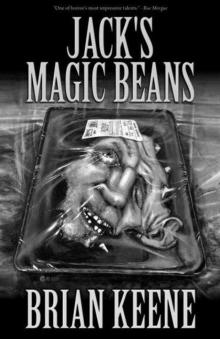 Jacks Magic Beans
Jacks Magic Beans Ghost Walk
Ghost Walk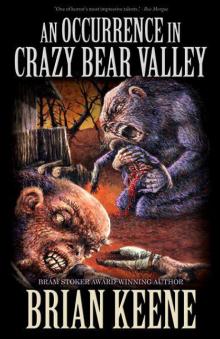 An Occurrence in Crazy Bear Valley
An Occurrence in Crazy Bear Valley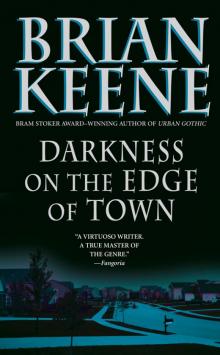 Darkness on the Edge of Town
Darkness on the Edge of Town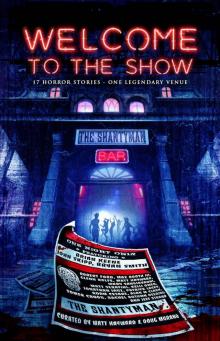 Welcome to the Show: 17 Horror Stories – One Legendary Venue
Welcome to the Show: 17 Horror Stories – One Legendary Venue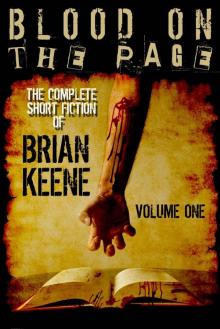 Blood on the Page: The Complete Short Fiction of Brian Keene, Volume 1
Blood on the Page: The Complete Short Fiction of Brian Keene, Volume 1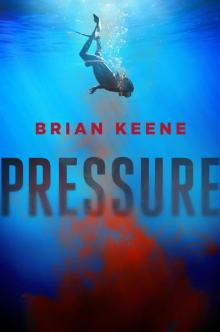 Pressure
Pressure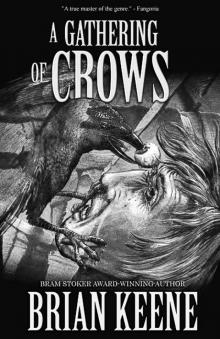 A Gathering of Crows
A Gathering of Crows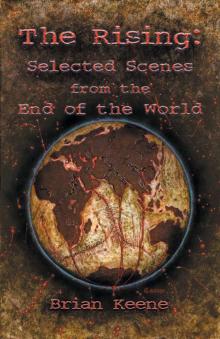 The Rising: Selected Scenes From the End of the World
The Rising: Selected Scenes From the End of the World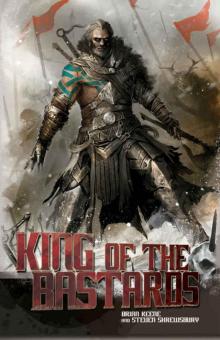 King of the Bastards
King of the Bastards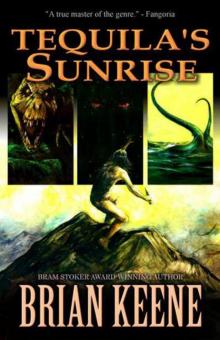 Tequila's Sunrise
Tequila's Sunrise All Dark, All the Time
All Dark, All the Time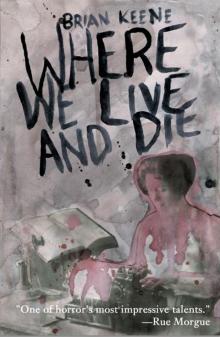 Where We Live and Die
Where We Live and Die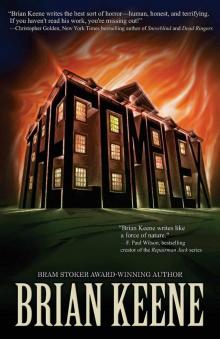 The Complex
The Complex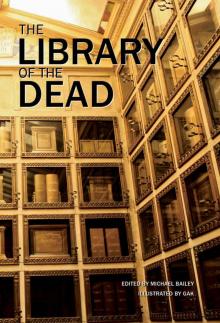 The Library of the Dead
The Library of the Dead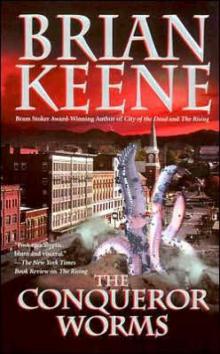 The Conqueror Worms
The Conqueror Worms The Girl on the Glider
The Girl on the Glider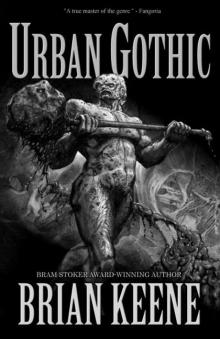 Urban Gothic
Urban Gothic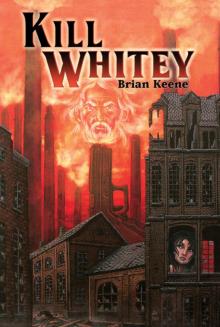 Kill Whitey
Kill Whitey Terminal
Terminal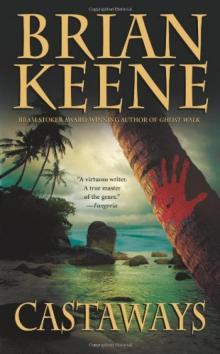 Castaways
Castaways